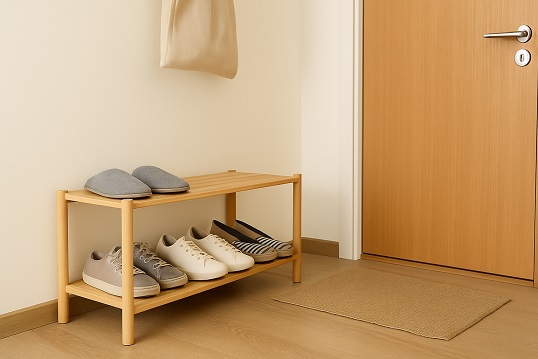
You’ve just arrived at a German friend’s home. As you step into the hallway, they smile and casually say, “Schuhe bitte ausziehen” – please take off your shoes. Before you can even look for a spot, you’re offered a pair of cozy slippers. Welcome to one of Germany’s most universal house rules.
While this might be familiar to people from Scandinavia, Japan, or parts of Canada, visitors from countries where wearing shoes indoors is common – like the UK or US – often find this expectation surprising, even puzzling.
In Germany, removing your shoes indoors is more than a quirk. It’s a reflection of deeper cultural principles: cleanliness, order, respect for personal space, and the invisible structure known as the Hausordnung (house rules). In this article, we’ll explore what’s behind this everyday behavior, what other house rules Germans follow, and how it all fits into the broader etiquette landscape of German life.
Why Germans Remove Their Shoes Indoors
The practice of removing shoes at the threshold is nearly universal in German homes. Here’s why it matters:
1. Cleanliness Comes First
German streets, especially in urban areas, are not considered clean. The soles of shoes are seen as dirty carriers of city grime, dog droppings, and rain-soaked bacteria. Why track that into your living space?
Removing shoes helps keep the home tidy and hygienic – a value reinforced by other habits like Kehrwoche, the rotating building cleaning duty (read more here).
2. Respect for Shared Space
When you enter someone’s home in Germany, you are stepping into a carefully maintained private world. Taking off your shoes is a signal that you respect that space and understand your role as a guest.
3. Cultural Norms and Early Socialization
Children in Germany are taught early to remove shoes indoors, whether at home, daycare, or school. It’s not optional; it’s expected. As such, adults do it instinctively – just as they would say “Guten Appetit” before eating or “Gesundheit” after a sneeze.
The Hausschuhe Tradition
Not only are you expected to remove your outdoor shoes – you’re often given a pair of indoor slippers, or Hausschuhe. These may be basic felt slip-ons, fuzzy moccasins, or practical Birkenstock house sandals.
Offering guests Hausschuhe is a kind gesture that says: “Make yourself at home – but not too much.”
In German families, each member may have their own pair waiting by the door, and it’s common to find a small shoe rack or basket in the entrance hall filled with guest slippers. Some homes even have Filzpantoffeln (felt slippers) specifically marked “Gäste.”
It’s practical. It’s polite. It’s very, very German.
Hausregeln: The House Rules Behind the Habit
The no-shoes custom is part of a broader system of Hausregeln, or house rules. These unwritten – but widely accepted – rules govern how one behaves inside a German home. They vary slightly from family to family but generally include:
- Shoes off at the door
- Always greet and say goodbye to everyone present
- Use indoor voices – especially during Ruhezeiten (quiet hours)
- Close doors behind you (Germans love a closed door)
- Always say “Guten Appetit” before eating
- No feet on furniture – ever
- Tidy up after yourself promptly
In shared apartments or Wohngemeinschaften (WGs), house rules may even be written down and agreed upon among roommates. These can include:
- Cleaning schedules
- Guest policies
- Use of shared supplies
- Recycling instructions
These domestic regulations reflect the same cultural values seen in public: structure, fairness, and mutual respect.
The Psychology Behind the No-Shoes Rule
Removing shoes indoors isn’t just about hygiene or habit – it’s about mental and emotional boundaries. In German culture, home is a sanctuary, not an extension of the public sphere.
Keeping shoes at the door symbolically separates the outside world from the personal realm. It’s a transition from the social to the private, the chaotic to the orderly.
It also reflects the German tendency toward clearly defined spaces and roles, a trait that shows up in everything from traffic systems to the way Germans queue (or don’t – explained here).
What Happens If You Don’t Remove Your Shoes?
If you forget – or ignore – the shoe rule, you may be gently reminded. Most Germans won’t be confrontational, but they will be uncomfortable if you walk through their home in boots or trainers.
Depending on the host’s personality, reactions may include:
- A polite but firm request to remove your shoes
- A nervous laugh followed by an offer of slippers
- A visible wince or uncomfortable shifting
- A quiet sense of disapproval that may never be voiced aloud
Not removing your shoes can be seen as inconsiderate, messy, or even rude – especially if you leave behind muddy footprints.
In shared flats, violations of the no-shoes rule can lead to roommate tensions. In rented homes, some landlords may even include carpet damage clauses related to outdoor footwear.
Exceptions to the Rule?
There are a few cases where wearing shoes indoors may be tolerated:
- Construction workers or delivery staff: If they must enter, some Germans will place down paper or plastic runners.
- Elderly guests: May be excused due to comfort or health.
- Formal home events: At very rare occasions like cocktail parties, shoes may stay on – but this is rare and usually signaled in advance.
- Tourists in short-term rentals: Hosts may be more lenient, but many Airbnbs still post no-shoes requests.
When in doubt, always ask at the door: “Möchten Sie, dass ich die Schuhe ausziehe?” (“Would you like me to take off my shoes?”). The answer will almost always be yes – but your asking shows cultural awareness and courtesy.
Shoes Off in Other Spaces
While private homes are the main zone for the shoes-off rule, you’ll also see it in:
- Daycares and kindergartens: Children have indoor shoes for the classroom.
- Yoga studios or gyms: You switch from street shoes to indoor sneakers or socks.
- Saunas and spas: Shoes off, slippers on – sometimes barefoot is required.
- Some university rooms or private practices: Depending on the flooring and formality.
These transitions reflect Germany’s emphasis on contextual behavior – knowing what’s appropriate for each space and acting accordingly.
How It Ties into the Bigger Picture
The no-shoes rule is just one facet of a larger system of quiet, clean, considerate living in Germany. Think of it alongside:
- Quiet hours (Quiet Hours in Germany)
- Rotating cleaning duties (Kehrwoche)
- Dining etiquette (Why Germans Always Separate the Bill)
- Public transport norms (German Public Transport Etiquette)
In each case, the underlying message is the same: respect shared space, follow the rules, and don’t cause unnecessary disturbance.
Tips for Visitors and Expats
If you’re visiting or living in Germany, here’s how to navigate indoor etiquette:
- Always look for a shoe rack or pile of shoes at the entrance.
- Carry clean socks or light slippers if visiting often.
- Ask if unsure—better to confirm than to assume.
- Respect slipper offers—even if they look ridiculous.
- Don’t walk around in socks with holes—Germans notice.
- At your own home, consider adopting the practice—it shows integration.
Small Rule, Big Meaning
At first glance, the no-shoes rule might seem like a practical detail. But in Germany, it carries deeper meaning. It’s a quiet gesture of respect, an acknowledgment that the home is private, orderly, and cared for.
By removing your shoes, you’re not just keeping the floor clean – you’re stepping into the German mindset: that comfort and community thrive when everyone knows the rules – and follows them.
Explore More from the Everyday German Life & Etiquette Series:
- Everyday German Etiquette: The Unspoken Rules That Surprise Tourists
- Why Germans Always Separate the Bill: Dining Etiquette Explained
- Quiet Hours in Germany: How Noise Laws Shape Daily Life
- The “Kehrwoche” Phenomenon: Cleaning Duties in Shared Buildings
- Public Transport Etiquette in Germany: The Unspoken Social Code
- Silence in German Culture: Why Quietness Is a Virtue
- How Germans Queue (or Don’t): Line Etiquette Across the Country







